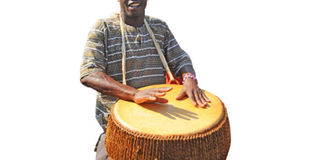The drum: An African cultural symbol

Drums hold a significant place in different tribes in Uganda. They are used in entertainment, communication and performances at cultural rituals or ceremonies. Photo by Faiswal Kasirye
What you need to know:
As a musical instrument, the drum faces a threat from other Western instruments but culturally, it has an edge.
A mini-survey among 10 office colleagues indicates only two of them would prefer music made with drums to Western music as entertainment at their wedding receptions. About five of them would prioritise Western music with a mix of the traditional drum beats.
“I have friends from all over Uganda and these are from different ethnic backgrounds. If you bring Ganda drums, you would probably alienate those from other regions. If you offer something from Busoga, probably others would be put off… Western music would not present such a problem as it cuts across in terms of appeal,” a respondent reasoned.
Another said hiring a traditional troupe would be prohibiting in terms of cost and in addition, the drums may not provide the kind of entertainment guests would enjoy all night long.
The views seem to portray that the traditional Ugandan drum is under threat from the onslaught of cultural globalisation, powered by advances in entertainment technology.
Drum here to stay
Yet local artiste Herman Ssewannyana and educationist James Isabirye emphasise that to Ugandan communities, life would be incomplete without a drum. If one married, the drum would set the pace for all rhythms for different kinds of dances to celebrate the marriage.
When twins were born to a family, the celebration of the blessing would be crowned with a dance feast where the drum was central.
“The drum is a focal point (for entertainment) and cuts across all ethnic groups in Uganda, except the Karamajongs. Beyond entertainment, the drum also used to be a tool of communication,” says Isabirye.
He adds that when Alice Lakwena attacked Busoga, the sight of a rebel would be brought to the knowledge of the villagers by drumming. If someone committed suicide, the drum would be sounded to alert the community of the catastrophe.
In Buganda, the ssagala-agalamidde would be sounded to summon the community for public work.
The Kadodi among the Bagisu precedes a circumcision ceremony, an initiation of young men into manhood. Orunyege among the Banyoro and Batooro is a depiction of the process of courtship.
THE FUTURE OF THE DRUM
Herman Ssewanyana, a drummer with Afrigo Band and Percussions Discussion, says the Uganda drum has a future and cannot get extinct, though it is under threat from western influence.
“At the world stage, people are tired of Western and South African music and today, the East African drums and music is the in-thing. I am telling you this out of experience. I have been to the Netherlands and played our drums to audiences there and people are just wow!” observes the jovial artiste.
“I am doing fusion and I can assure you the Ugandan drum can be used for anything be it African rhythm or world music,” Ssewannyana adds.
“I have undertaken it as an obligation to train children and youngsters who have an interest in drums so that this knowledge is passed on to future generations. Every holiday I get children here (at the National Theatre) and I train them in different rhythms,” he said.
James Isabirye, who lecturers in the department of Music, Dance and Drama at Kyambogo University, believes the drum is a constant feature in our society.
Here to stay
“The drum can never be out of the lives of Ugandans, not even in the near future. While there is change and people adapt things foreign, they still have values and meanings they attach to drums. Survival of society is routed in culture and a drum is a symbol of (Ugandan) culture,” Isabirye says.
“Those who are buying the expensive machines that can play Western music are just a few in urban areas and remember, majority of Ugandans live in rural areas and still lead a traditional lifestyle. You will always find the drum there,” he adds.
THE DRUM IN AFRICA
Historical: African drums hold a special place in the history of Africa. In Western culture, the idea of drumming is nearly always associated with entertainment or just to add to the musical quality of a song. In Africa, drums hold a deeper symbolic and historical meaning.
Use: Drums are almost always an accompaniment for any manner of ceremony – births, deaths, marriages – together with a ritual dance. The vicious sound of many drums pounding together was also a necessary installment to stir up emotions in a battle to inspire excitement and passion.
Royalty: In much of Africa, certain drums symbolise and protect royalty and are often housed in sacred dwellings.
Communication: Tribes, with the use of the drum, would communicate with other tribes often miles away. Drums were often used to signal meetings, dangers, etc.
africaimports.com




